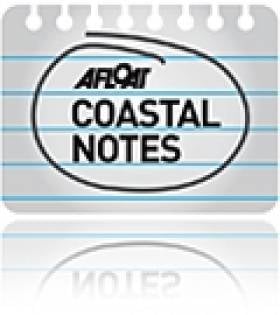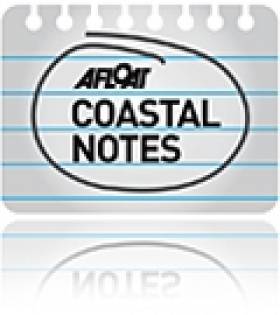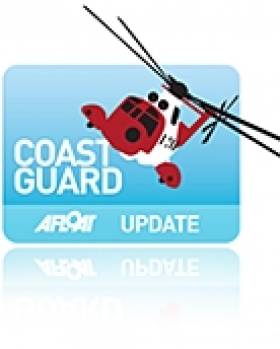Displaying items by tag: Cliffs of Moher
#burren – The successful management and promotion of the Burren and Cliffs of Moher Geopark as a sustainable destination has been officially recognised by one of the world's foremost tourism and travel award schemes.
The World Travel & Tourism Council (WTTC) has named the Geopark as one of 18 finalists for its 2014 Tourism for Tomorrow Awards, the winners of which will be announced at a tourism summit in Hainan, China tomorrow (Thursday, 24 April 2014).
Carol Gleeson, Project Manager for Burren and Cliffs of Moher Geopark has travelled to China for the WTTC ceremony and tourism summit which is also being attended by Minister for Transport, Tourism and Sport, Mr Leo Varadkar TD.
The Tourism for Tomorrow Awards are one of the highest accolades in the global Travel & Tourism industry recognising sustainable tourism best practices in businesses and destinations worldwide, ranging from local destinations to global hotel groups, international airlines, luxury tour operators and small eco-lodges.
Award applications were received this year from 56 countries, representing all continents. The Burren and Cliffs of Moher Geopark has been shortlisted alongside Bonito (Brazil) and Temes S.A. - Costa Navarino (Greece) as 'Destination Award' finalists for "showing commitment to supporting and delivering sustainable tourism best practices in their destinations."
Speaking ahead of tomorrow's ceremony in Hainan, Carol Gleeson said the award nomination is testament to the partnership approach to promoting sustainable tourism in the Burren that has been developed by regional development agencies and the local community.
She explained: "Since 2008, Clare County Council has been working in the Burren to develop a truly sustainable tourism destination that gives direct benefits to the local community, promotes and celebrates local culture and produce, preserves the environment and provides a great experience for our visitors. This has been achieved with great support and partnership from local communities and businesses and agencies responsible for tourism and conservation and local development."
"This work includes establishing the Burren Ecotourism Network as far back as 2008, achieving UNESCO recognised Global Geopark status in 2011 and providing environmental and business training, developing a destination brand, promoting certification, and importantly linking high responsible tourism standards with economic benefit to the area. The Geopark has also attracted €2.2m funding through the EU Life programme to develop an international sustainable tourism destination model," Ms. Gleeson added.
According to Costas Christ, Chairman of the Judging Panel: "Each year, the Tourism for Tomorrow Awards recognize sustainable tourism best practices in action, helping to transform the Travel & Tourism industry based upon the principles of environmentally friendly operations, support for the protection of cultural and natural heritage, and direct benefits to the social and economic well-being of local people in travel destinations around the world. This year's Finalists continue to demonstrate that when carefully managed, tourism can be a powerful force for improving livelihoods and protecting our planet for future generations."
Further information on the Burren & Cliffs of Moher is available on www.burrengeopark.ie.
€550k Facilities Upgrade Plan For Cliffs Of Moher
#CliffsOfMoher - The visitor centre at the Cliffs of Moher, one of the most high profile and best known discovery points along the newly launched Wild Atlantic Way, is to benefit from significant upgrade works during the coming weeks.
Management at the Cliffs of Moher Visitor Experience in Co Clare have announced a €550,000 plan to upgrade the existing public car park, provide additional coach parking, and upgrade the centre's exhibition.
Contracts have already been awarded for the coach parking and exhibition upgrades, with works due to commence shortly, while a planning application has been submitted in respect of the proposed car park improvements.
Mayor of Clare Cllr Joe Arkins welcomed the announcement, saucing: "The Wild Atlantic Way presents significant opportunities for tourism development right along the western seaboard of Ireland with Clare prominently featured as part of the new touring route that stretches from Donegal to West Cork.
"The proposed upgrade works at the Cliffs of Moher will complement what is already a high quality visitor attraction and will enable management at the cliffs to build on the impressive visitor number increases experienced during the past three years."
Visitor numbers at the Cliffs of Moher Visitor Experience were up 10% during 2013. Some 960,134 people visited the world famous tourist attraction last year compared to 873,988 during the previous year.
It is the third successive increase in visitor numbers to the Cliffs of Moher with year-on-year increases of 12% and 8% being achieved during 2011 and 2012 respectively.
Commenting on the proposed works, cliffs director Katherine Webster said: "The upgrades to the coach park and car park will provide an improved experience for our group and car based customers with increased capacity and a better layout including e-car charging points, additional disabled parking and improved pedestrian flow.
"The new exhibition content will bring fresh exciting new experiences and greater visitor interactivity to the Cliffs Exhibition. The upgrade is being provided by Dublin-based Rockbrook Engineering, and we’re delighted with how their proposals will bring some of the outdoor experience of the cliffs inside into the dome area."
The Cliffs of Moher Visitor Experience is one of three Signature Discovery Points in Co Clare along the route of the Wild Atlantic Way, the others being the Bridges of Ross and Loop Head Lighthouse.
March's Big Waves Tease a Wild Summer of Surfing
#SURFING - Irish surf classifieds website Surfseekers.ie has compiled some stunning images from March's world-class surfing conditions.
From the biggest rollers in years off Mullaghmore Head in Co Sligo to the Cliffs of Moher and even as far south as Kerry, Ireland has seen some of its best surf in a long time - and things are certainly looking up for an exciting summer on the waves.
Eight Searches at Cliffs of Moher in 2011 for Doolin Coastguard
#COASTGUARD - The Irish Coast Guard's Doolin unit conducted eight searches for missing people at the Cliffs of Moher in 2011, according to The Irish Times.
Doolin officer Mattie Shannon told the paper that six bodies were recovered by the coastguard unit of the cliffs, which are one of the most popular tourist destinations in the country - but have also become a blackspot for suicide attempts.
The Samaritans have put up signs in the area advertising their helpline, while staff at the cliffs' visitor centre have received training for suicide intervention.
A spokesperson for The Samaritans said that the installation of a special phone with a direct line to their anonymous counselling service may also be considered.
The Irish Times has more on the story HERE.

































































